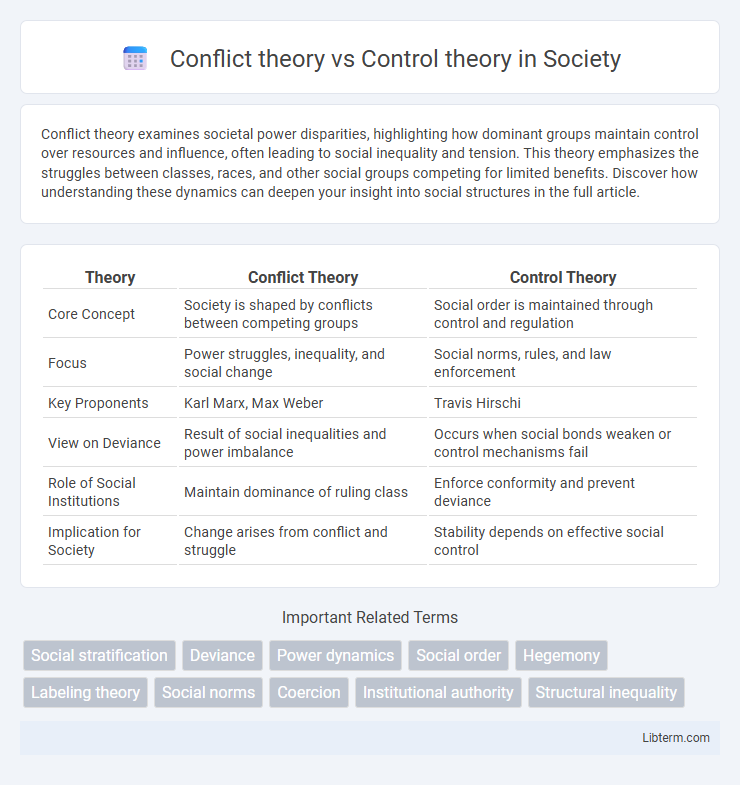Conflict theory examines societal power disparities, highlighting how dominant groups maintain control over resources and influence, often leading to social inequality and tension. This theory emphasizes the struggles between classes, races, and other social groups competing for limited benefits. Discover how understanding these dynamics can deepen your insight into social structures in the full article.
Table of Comparison
| Theory | Conflict Theory | Control Theory |
|---|---|---|
| Core Concept | Society is shaped by conflicts between competing groups | Social order is maintained through control and regulation |
| Focus | Power struggles, inequality, and social change | Social norms, rules, and law enforcement |
| Key Proponents | Karl Marx, Max Weber | Travis Hirschi |
| View on Deviance | Result of social inequalities and power imbalance | Occurs when social bonds weaken or control mechanisms fail |
| Role of Social Institutions | Maintain dominance of ruling class | Enforce conformity and prevent deviance |
| Implication for Society | Change arises from conflict and struggle | Stability depends on effective social control |
Introduction to Conflict Theory and Control Theory
Conflict theory examines society through the lens of power struggles and inequalities, highlighting how dominant groups maintain control by exploiting subordinate groups. Control theory focuses on the importance of social bonds and institutions in preventing deviant behavior, emphasizing how weak attachments increase the likelihood of rule-breaking. Both theories offer critical frameworks for understanding social order and deviance from contrasting perspectives on authority and conformity.
Historical Background of Both Theories
Conflict theory originated in the mid-19th century, rooted in the works of Karl Marx who emphasized class struggles and economic inequality as drivers of social conflict. Control theory emerged in the 1960s, developed by sociologist Travis Hirschi, focusing on the social bonds and controls that prevent individuals from engaging in deviant behavior. Both theories arose during periods of social change, with Conflict theory reflecting industrial capitalism critiques, while Control theory responded to rising concerns about juvenile delinquency and social order.
Key Concepts in Conflict Theory
Conflict theory centers on power disparities and social inequality, emphasizing how dominant groups maintain control over resources and influence societal norms. It highlights concepts such as class struggle, exploitation, and institutionalized oppression as drivers of social conflict. Key terms include hegemony, bourgeoisie and proletariat dynamics, and systemic inequality shaping laws and social order.
Core Principles of Control Theory
Control theory centers on the idea that social order is maintained through individuals' bonds to society, such as attachment, commitment, involvement, and belief, which prevent deviant behavior. It posits that weaker social bonds increase the likelihood of rule-breaking by reducing individuals' restraint and investment in conformity. The core principle emphasizes internal and external controls that shape behavior, contrasting with conflict theory's focus on power struggles and social inequality as drivers of deviance.
Major Proponents and Influencers
Conflict theory, primarily advanced by Karl Marx, emphasizes power struggles and economic inequalities driving social conflict and change, while Max Weber expanded its reach to include status and party dimensions. Control theory, rooted in the work of Travis Hirschi, examines social bonds and belief systems that prevent deviant behavior, highlighting the role of socialization and attachment. Both theories significantly influence criminology and sociology by providing distinct frameworks: conflict theory critiques systemic oppression, whereas control theory analyzes the mechanisms maintaining social order.
Conflict Theory vs Control Theory: Comparative Analysis
Conflict Theory emphasizes the power struggles and disparities within society, asserting that social order is maintained through domination and coercion by ruling groups. Control Theory explains conformity by focusing on the strength of social bonds and internalized norms that prevent deviance, highlighting the role of societal and personal control mechanisms. A comparative analysis reveals Conflict Theory centers on external socio-economic inequalities driving conflict, while Control Theory highlights internal socialization processes and bonds as key factors in regulating behavior.
Application in Sociology and Criminology
Conflict theory, emphasizing power disparities and social inequality, is applied in sociology and criminology to analyze how dominant groups create laws that serve their interests and marginalize others. Control theory, focusing on social bonds and individual self-control, is used to explain why people conform to societal norms and avoid deviance due to their connections with family, peers, and institutions. Both theories guide research and policies by highlighting different mechanisms behind crime causation and social order maintenance.
Strengths and Weaknesses of Each Theory
Conflict theory highlights power struggles and social inequality as central to understanding deviance, effectively explaining systemic oppression and class conflicts; however, it tends to overlook individual agency and micro-level interactions. Control theory emphasizes social bonds and internalized norms to explain conformity, offering a clear framework for why individuals follow rules but sometimes underestimates the influence of structural factors and broader social inequalities. Both theories provide valuable insights but require integration with other perspectives to fully capture the complexity of deviant behavior.
Real-World Examples and Case Studies
Conflict theory explains social behavior through power struggles, as seen in labor strikes where workers challenge corporate authority to demand fair wages and better conditions, highlighting economic inequalities. Control theory emphasizes social bonds and conformity, exemplified by rehabilitation programs reducing recidivism by strengthening offenders' ties to family and community. Case studies on school violence show conflict theory analyzing systemic inequality's role, whereas control theory focuses on the breakdown of student attachments to institutional norms.
Conclusion: Implications for Social Policy and Research
Conflict theory highlights the need for social policies that address systemic inequalities and power imbalances to reduce social tensions and promote justice. Control theory emphasizes strengthening social bonds and community mechanisms to prevent deviant behavior and increase social cohesion. Integrating insights from both theories can enhance research by creating multidimensional approaches that target structural and individual factors influencing social order.
Conflict theory Infographic

 libterm.com
libterm.com